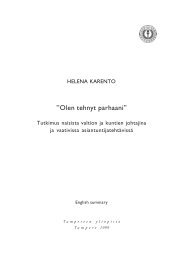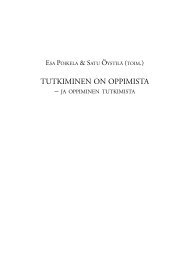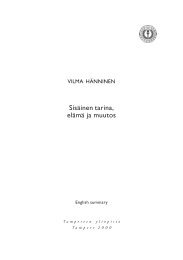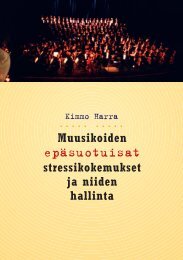Note on this edition: this is an electronic version of the 1999 book ...
Note on this edition: this is an electronic version of the 1999 book ...
Note on this edition: this is an electronic version of the 1999 book ...
You also want an ePaper? Increase the reach of your titles
YUMPU automatically turns print PDFs into web optimized ePapers that Google loves.
Unravelling <strong>the</strong> Dem<strong>on</strong>ic Text 91open to “<strong>the</strong>matic” or “<strong>the</strong>rapeutic” reading that aims at <strong>an</strong> integrati<strong>on</strong>, expl<strong>an</strong>ati<strong>on</strong>,underst<strong>an</strong>ding; <strong>th<strong>is</strong></strong>, <strong>on</strong> <strong>the</strong> o<strong>the</strong>r h<strong>an</strong>d, participates in <strong>the</strong> “violence<strong>of</strong> reas<strong>on</strong>” towards its o<strong>the</strong>r. The plural <strong>is</strong> in d<strong>an</strong>ger <strong>of</strong> being madem<strong>on</strong>ological. From <strong>an</strong>o<strong>the</strong>r viewpoint, however, <strong>the</strong> complete denial <strong>of</strong> integrativereading <strong>an</strong>d interpretati<strong>on</strong> amounts to essential<strong>is</strong>ing <strong>the</strong> c<strong>on</strong>flictingelements in <strong>the</strong> dem<strong>on</strong>ic. Ricoeur’s “dynamic identity” <strong>of</strong> a text <strong>is</strong> <strong>on</strong>e way<strong>of</strong> articulating <strong>th<strong>is</strong></strong> necessary tensi<strong>on</strong> <strong>an</strong>d dialectic between particular interpretati<strong>on</strong>s<strong>of</strong> dem<strong>on</strong>s or “dem<strong>on</strong>ic textuality” <strong>an</strong>d that “reserve <strong>of</strong> o<strong>the</strong>rness”that will always remain irreducible. As <strong>the</strong> “<strong>the</strong>matic” <strong>an</strong>d “dec<strong>on</strong>structive”moments <strong>of</strong> <strong>an</strong>alys<strong>is</strong> inform each o<strong>the</strong>r <strong>the</strong>y do not remain immutable;<strong>the</strong> awareness <strong>of</strong> multiple centres <strong>of</strong> significati<strong>on</strong> <strong>an</strong>d <strong>the</strong> radical effects<strong>of</strong> <strong>the</strong> reader’s positi<strong>on</strong> or h<strong>is</strong> dec<strong>on</strong>textual<strong>is</strong>ing activity shifts <strong>the</strong> focusfrom <strong>the</strong> “truth” <strong>of</strong> a text to its rhetoric. 47Derrida has explored <strong>the</strong> dem<strong>on</strong>ic versus <strong>the</strong> integrative aspects <strong>of</strong> l<strong>an</strong>guagein h<strong>is</strong> essay “Plato’s Pharmacy.” The point <strong>of</strong> departure <strong>is</strong> <strong>the</strong> questi<strong>on</strong>ablemetaphysical status <strong>of</strong> writing in m<strong>an</strong>y systems <strong>of</strong> thought. As Paulwrites in <strong>the</strong> Bible: “<strong>the</strong> written code kills, but <strong>the</strong> Spirit gives life.” 48 Derridatackles <strong>the</strong> myth about writing’s origin in Plato’s Phaedrus <strong>an</strong>d <strong>the</strong> c<strong>on</strong>demnati<strong>on</strong>it receives <strong>the</strong>re. According to <strong>th<strong>is</strong></strong> story (narrated by Socrates in<strong>the</strong> dialogue), <strong>the</strong> <strong>an</strong>cient Egypti<strong>an</strong> god Theuth first invented writing, al<strong>on</strong>gwith numbers <strong>an</strong>d calculati<strong>on</strong> <strong>an</strong>d m<strong>an</strong>y o<strong>the</strong>r things. He brought <strong>the</strong>se inventi<strong>on</strong>sbefore King Thamus (<strong>the</strong> representative or incarnati<strong>on</strong> <strong>of</strong> Amm<strong>on</strong>,<strong>the</strong> high god <strong>of</strong> <strong>the</strong> sun), <strong>an</strong>d <strong>the</strong> King blamed or pra<strong>is</strong>ed <strong>the</strong> usefulness <strong>of</strong>each <strong>on</strong>e. The d<strong>is</strong>cussi<strong>on</strong> <strong>of</strong> writing was <strong>of</strong> special interest to Plato, as it <strong>is</strong> toDerrida:[…] Theuth said, “Th<strong>is</strong> d<strong>is</strong>cipline, my King, will make <strong>the</strong> Egypti<strong>an</strong>s w<strong>is</strong>er<strong>an</strong>d will improve <strong>the</strong>ir memories: my inventi<strong>on</strong> <strong>is</strong> a recipe (pharmak<strong>on</strong>) forboth memory <strong>an</strong>d w<strong>is</strong>dom.” But <strong>the</strong> king said, “Theuth, my master <strong>of</strong> arts,[…] your paternal goodwill has led you to pr<strong>on</strong>ounce <strong>the</strong> very opposite <strong>of</strong>47The import<strong>an</strong>ce <strong>of</strong> rhetoric in <strong>the</strong> text r<strong>is</strong>es from its complex status as a layer <strong>of</strong> activity<strong>an</strong>d underst<strong>an</strong>ding that moves bey<strong>on</strong>d mere syntax <strong>an</strong>d grammar. Wayne C. Booth,in h<strong>is</strong> classic study The Rhetoric <strong>of</strong> Ficti<strong>on</strong> pays attenti<strong>on</strong> to <strong>the</strong> various, <strong>of</strong>ten indirectways <strong>the</strong> author (in <strong>the</strong> text) implies something to <strong>the</strong> reader <strong>an</strong>d <strong>the</strong>reby persuades him,even if <strong>the</strong> text at <strong>the</strong> level <strong>of</strong> grammar <strong>an</strong>d syntax seems to say something else. Accordingto Booth “<strong>the</strong> greatest literature” <strong>is</strong> “radically c<strong>on</strong>taminated with rhetoric,” <strong>an</strong>d engagesreaders with its ambiguous <strong>an</strong>d indirect me<strong>an</strong>s. (Booth 1961, 98.) Rhetoric c<strong>an</strong> begiven both pragmatic <strong>an</strong>d dec<strong>on</strong>structive interpretati<strong>on</strong>s, <strong>the</strong> latter here exemplified byPaul de M<strong>an</strong>. In h<strong>is</strong> article “Semiology <strong>an</strong>d Rhetoric,” de M<strong>an</strong> admits that <strong>the</strong> exact <strong>the</strong>oreticald<strong>is</strong>tincti<strong>on</strong> between <strong>the</strong> ep<strong>is</strong>temology <strong>of</strong> grammar <strong>an</strong>d <strong>the</strong> ep<strong>is</strong>temology <strong>of</strong> rhetoric<strong>is</strong> bey<strong>on</strong>d h<strong>is</strong> powers; he never<strong>the</strong>less points to <strong>the</strong> import<strong>an</strong>ce <strong>of</strong> <strong>the</strong> “rhetoricalquesti<strong>on</strong>” to literary studies. The undecidability between a literal me<strong>an</strong>ing <strong>an</strong>d a figurativeme<strong>an</strong>ing marks <strong>the</strong> domain <strong>of</strong> rhetoric for de M<strong>an</strong>: “Rhetoric radically suspends logic<strong>an</strong>d opens up vertiginous possibilities <strong>of</strong> referential aberrati<strong>on</strong>.” (de M<strong>an</strong> 1979, 10.) Th<strong>is</strong>ignores <strong>the</strong> more pragmatic aspects <strong>of</strong> rhetoric in <strong>the</strong> text (<strong>the</strong> establ<strong>is</strong>hment <strong>of</strong> “good”<strong>an</strong>d “evil,” or sympathy <strong>an</strong>d d<strong>is</strong>t<strong>an</strong>ce in <strong>the</strong> use <strong>of</strong> figurative l<strong>an</strong>guage or narrati<strong>on</strong>, forexample).482 Cor. 3:6.














